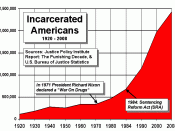Are juveniles as under control today as they were in the past? Crime plays a major role in today's society. The government has always followed the policy that no crime goes unpunished. The controversy that surrounds the United States courtrooms today is whether or not a minor needs to stand trial as an adult for committing a serious offense. These decisions made by the judge or jury in the preliminary hearing affect the rest of the suspects' life. The opposing argument to the issue of juveniles being tried as adults remain that the minor is too young and immature to understand the consequences of what they did wrong. Although there is some truth to this allegation, the reality of this social issue is far more complex. Therefore we ask the question, should childhood offenders be treated as adults? Juveniles need to be punished according to the severity of the crime in which they commit.
Ultimately, juveniles should stand trial as adults.
The opposition believes that holding court cases where juveniles remain tried as adults undoubtedly violates the rights of the juvenile. Initially, the age of a person when the alleged crime occurred decides whether or not they will be tried as a juvenile. Definitions of what a juvenile is vary for different purposes within individual states as well as among different states (Rosenheim). Children, ages seven to seventeen, who are suspected of a crime, must be treated as children in need of guidance and encouragement, and not as vicious criminals (Emerson). Maybe the guidance and encouragement to these juveniles should be the responsibility of their parents, possibly preventing the crime in the first place. The opposition also feels that juveniles cannot accept full responsibility for their actions because they insist that each minor who committed a crime was influenced in...


